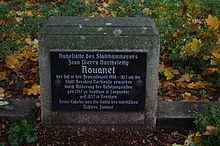Jean Pierre Barthélemy Rouanet
Jean Pierre Barthélemy Rouanet (born March 31, 1747 on the Septfaux estate in Languedoc ; † October 8, 1837 in Beeskow ) was a Franco-German soldier, educator, civil servant and writer.
Life
Rouanet was born in the diocese of St. Pons de Thomières, Hérault , the youngest of eleven children and destined for a spiritual career by his parents. However, he secretly left the University of Toulouse and became a soldier, but was not happy even in this capacity. After an interruption in his career as a soldier, several stays in prison and a desertion , he fled to Switzerland , where he was picked up by Prussian soldier recruits and taken to Breslau . In 1769 he became a member of the Potsdam Guard, but soon afterwards a teacher at the royal Pageschool . In 1781, after the intercession of his patron and sponsor Rhodich, he was given a position as senator and clerk in Beeskow. Although the population against the occupation of this place by a French and Catholics fought, Rouanet remained for decades in this office. His reputation increased during the Napoleonic Wars and the War of Liberation , as he was able to communicate with the French commanders and occupiers. In 1813 he prevented a battle between French army members and Prussian recruits in Beeskow, which, due to the superiority of the French, would certainly have ended with a defeat for the Prussians. Rouanet did not retire until 1828.
A descendant of Jean Pierre Barthélemy Rouanet was Emilie Rouanet-Kummer, who later became the wife of Theodor Fontane . His daughter Martha published the memoirs of her great-grandfather under the title From Toulouse to Beeskow . The Rouanet-Gymnasium Beeskow is named after Rouanet .
Web links
- Literature by and about Jean Pierre Barthélemy Rouanet in the catalog of the German National Library
| personal data | |
|---|---|
| SURNAME | Rouanet, Jean Pierre Barthélemy |
| ALTERNATIVE NAMES | Rouanet, Johann Peter |
| BRIEF DESCRIPTION | Franco-German educator, senator, registrar, writer |
| DATE OF BIRTH | March 31, 1747 |
| PLACE OF BIRTH | Well Septfaux, Languedoc |
| DATE OF DEATH | October 8, 1837 |
| Place of death | Beeskow |
